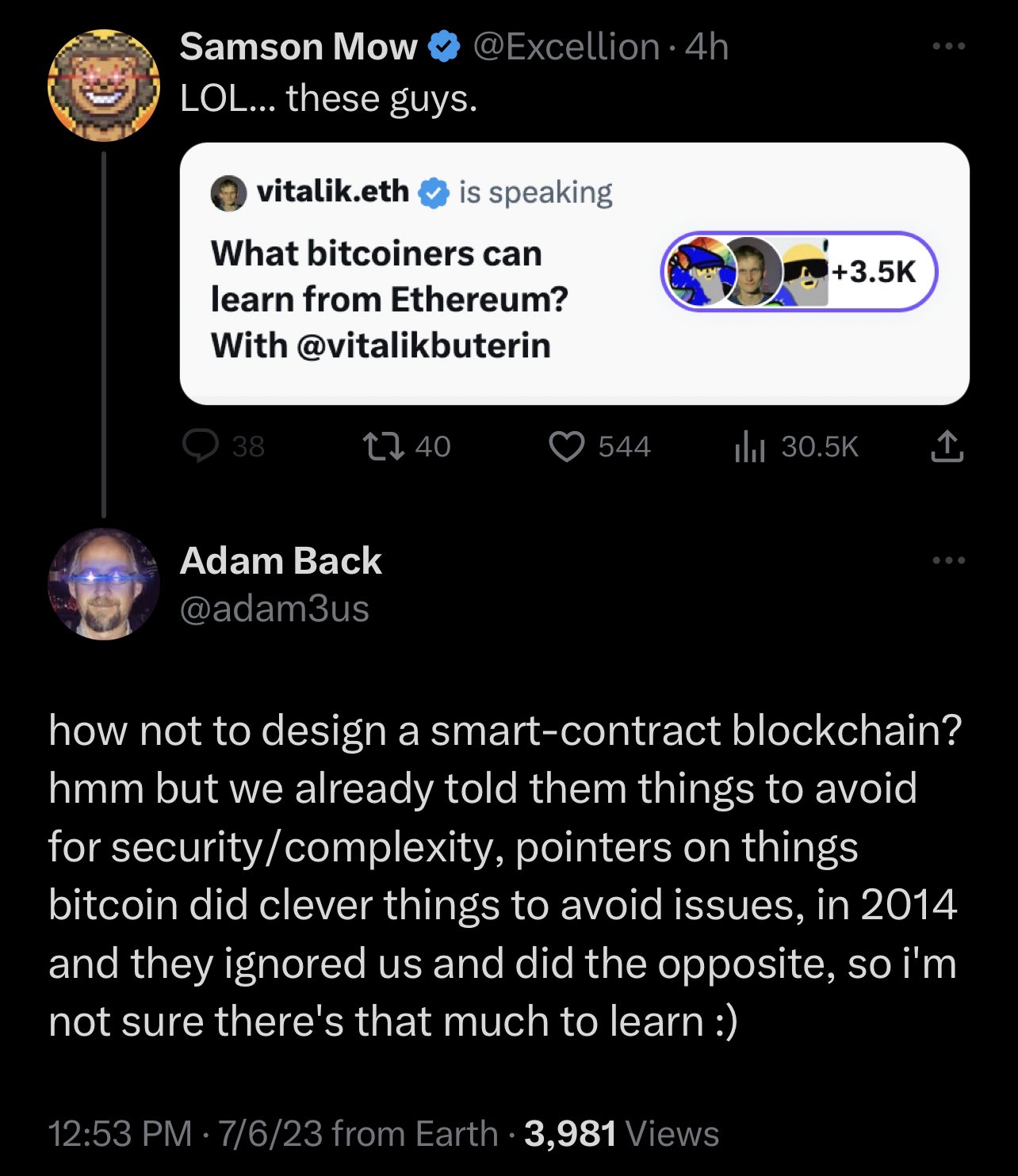V God พูดครั้งแรกเกี่ยวกับสิ่งที่นักพัฒนา Bitcoin สามารถเรียนรู้จากการเดินทางของ Ethereum?
เมื่อวันที่ 7 กรกฎาคม Vitalik Buterin และผู้สนับสนุน Bitcoin Eric Wall และ Udi Wertheimer พบกันที่ในพื้นที่ทวิตเตอร์พูดคุยโดยละเอียดถึงสิ่งที่นักพัฒนา Bitcoin สามารถเรียนรู้จากนักพัฒนา Ethereum
Eric Wall และ Udi Wertheimer ซึ่งเป็นบุคคลสำคัญสองคนในโปรเจ็กต์ Taproot Wizards ของ Ordinals ให้การสนับสนุน Ordinals อย่างเปิดเผย และมักจะสนับสนุนให้มีการปรับปรุงที่สร้างขึ้นบนเครือข่าย Bitcoin
Buterin กล่าวว่าครั้งหนึ่งเขาเคยศึกษาเครื่องมือ Pie Bitcoin และพยายามสร้างไลบรารี Python เพื่อทำสิ่ง Bitcoin
Buterin กล่าวว่า Ordinals ได้ฟื้นคืน วัฒนธรรมผู้สร้าง ของ Bitcoin และได้รับการยกย่องอย่างสูงตามมาตรฐาน Ordinals ซึ่งเป็นมาตรฐาน BRC 20 และเชื่อว่าการเคลื่อนไหวดังกล่าวจะช่วยส่งเสริมระบบนิเวศ Bitcoin ที่ ซบเซา นิเวศวิทยานำวัฒนธรรมแห่งการปฏิบัติจริงกลับมาซึ่งเป็นสิ่งที่ดี ”
นอกจากนี้ ทั้งสามยังได้หารือเกี่ยวกับความสามารถในการขยายขนาดของระบบนิเวศ Bitcoin ตามข้อมูลของ Wall เครือข่าย Lightning ไม่สามารถปรับให้เข้ากับผู้ใช้ในอนาคตได้ และมักจะล้มเหลวเมื่อประมวลผล การชำระเงินขนาดกลาง ในการตอบสนอง Buterin ตอบว่าแนวทางที่ดีที่สุดคือการมุ่งเน้นที่การใช้โซลูชัน Layer-2 ประเภทต่างๆ ในขณะเดียวกันก็ค้นหาวิธีทำให้เลเยอร์ฐาน Bitcoin มีประสิทธิภาพมากขึ้น
แต่ Wertheimer เชื่อว่าการมุ่งเน้นไปที่ Rollups และการแนะนำ Layer-2 นั้นดี แต่เมื่อนำ Rollups มาใช้ เครือข่าย Bitcoin จะสามารถปรับใช้สัญญาอัจฉริยะได้
ถึงกระนั้น มุมมองของ Wall และ Wertheimer ก็ถูกวิพากษ์วิจารณ์จากผู้สนับสนุน Bitcoin ที่นับถือนิกายฟันดาเมนทัลลิสท์ พวกเขาแย้งว่าการใช้ NFT และสัญญาอัจฉริยะกับ Bitcoin จะทำให้ฟังก์ชันหลักในฐานะเครือข่ายเงินสดแบบ peer-to-peer ลดลง นักวิจารณ์เหล่านั้นรวมถึง Samson Mow ซีอีโอเมื่อวันที่ 3 มกราคม ซึ่งแย้งว่า Ordinals สิ้นเปลืองพื้นที่บล็อกที่สามารถนำมาใช้สำหรับการชำระเงินด้วย bitcoin
แต่ Wall ตอบว่า Bitcoin สามารถใช้เป็น ระบบพิสูจน์ สำหรับการพิสูจน์ความรู้แบบศูนย์โดยไม่ทำให้เครือข่ายแออัด เรา (ผู้สนับสนุน Bitcoin) ต้องการทำสิ่งต่าง ๆ ที่เกี่ยวข้องกับ DeFi อยู่เสมอ แต่เราแค่ต้องการให้ชั้นฐาน Bitcoin ทำหน้าที่เป็นผู้ตัดสินหรือผู้ตัดสินของการคำนวณโดยไม่ต้องรันการคำนวณแบบออนไลน์
Wall ยังคิดว่าเราไม่ควรคิดถึง Layers เป็นวิธีการชำระเงินเพียงอย่างเดียว แต่ฉันคิดว่าเราสามารถคิดถึงสิ่งที่พวกเขาสามารถทำได้มากกว่านี้ด้วย
การสนทนานี้ทำให้เกิดความขัดแย้งใหม่ในชุมชน Bitcoin เช่น Adam Beck ซีอีโอของ Blockstream ซึ่งคัดค้านสิ่งนี้ เราได้บอกพวกเขาถึงสิ่งที่ควรหลีกเลี่ยงในแง่ของความปลอดภัย/ความซับซ้อน และ Bitcoin ก็ทำในปี 2014 สิ่งที่ชาญฉลาดเพื่อหลีกเลี่ยงปัญหา และพวกเขาเพิกเฉยต่อเราและทำตรงกันข้าม ฉันก็เลยไม่แน่ใจว่ามีอะไรให้เรียนรู้อีกมาก”




